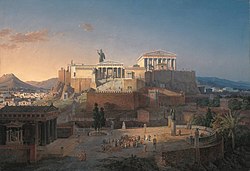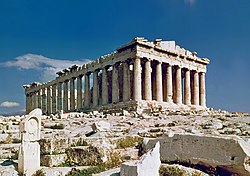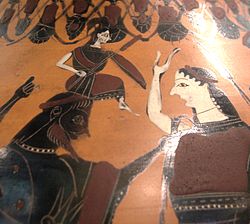Athena
Athena is the Greek goddess of wisdom, warfare, and handicraft. She is one of the Twelve Olympians. Athena's symbol is the owl, the wisest of the birds. She also had a shield called Aegis, which was a gift given to her by Zeus. She is usually shown wearing her helmet and often with her shield. The shield later had Medusa's head on it; after Perseus killed Medusa, he gave the head to Athena for safekeeping and she put it on her shield.
Athena is the protector of Athens, Greece, a city named after her. The Parthenon, which is on the Acropolis in Athens, is her most famous temple. She also helped many heroes, including Heracles, Jason, and Odysseus, and is always seen with Nike, the goddess of victory.
Birth
There are many stories about Athena's birth. In Hesiod's Theogony, Zeus married Metis, but soon after, Zeus was scared of her giving birth to a child because the Oracle of Delphi had said that she will give birth to Athena, and a son that would overthrow Zeus, just like Zeus overthrew Kronos, who overthrew his father Uranus.
To stop Metis giving birth to her son, Zeus made a plan. He played a game with Metis, they shape shifted into different animals, Metis turned turned into a fly, Zeus saw his chance and he swallowed her whole. Zeus was too late, as Metis was already pregnant.
While she was inside Zeus's head, Metis made a helmet, armor, and a robe for Athena. The hammering noise caused Zeus to have a severe headache. The headache became worse. Hephaestus split his head open and Athena came out full grown and with armor on.
Titles and patronages
Athena is the goddess of knowledge, purity, arts, crafts, learning, justice and wisdom. She also plays a tough, clever and independent role. Athenians thought she helped them win the Trojan war. Athena often helped heroes, especially ones who were not just brave but clever, like Jason and Perseus. People joined her cult, hoping she would give them victory. She was also the creator of the olive tree and flute.
Attributes and epithets
Athena was given many other titles. She has the epithet Ergane as the patron of craftsmen and artisans. With the epithet Parthenos she was especially worshipped in the festivals of the Panathenaea and Pamboeotia where both militaristic and athletic displays took place. With the epithet Promachos she led in battle. With the epithet Polias, Athena was the protector of not only Athens but also of many other cities, including Argos, Sparta, Gortyn, Lindos, and Larisa.
Athena Media
The Acropolis at Athens (1846) by Leo von Klenze. Athena's name probably comes from the name of the city of Athens.[1][2]
Fragment of a fresco from the Cult Center at Mycenae dating the late thirteenth century BC depicting a warrior goddess, possibly Athena, wearing a boar's tusk helmet and clutching a griffin.[3]
Ancient Akkadian cylinder seal (dating c. 2334–2154 BC) depicting Inanna, the goddess of war, armored and carrying weapons, resting her foot on the back of a lion[4]
The owl of Athena, surrounded by an olive wreath. Reverse of an Athenian silver tetradrachm, c. 175 BC
Athenian tetradrachm representing the goddess Athena
A new peplos was woven for Athena and ceremonially brought to dress her cult image (British Museum).
The Parthenon on the Athenian Acropolis, which is dedicated to Athena Parthenos[1]
Reverse side of a Pergamene silver tetradrachm minted by Attalus I, showing Athena seated on a throne (c. 200 BC)
Athena is "born" from Zeus's forehead as a result of him having swallowed her mother Metis, as he grasps the clothing of Eileithyia on the right; black-figured amphora, 550–525 BC, Louvre.
Related pages
| Wikimedia Commons has media related to Lua error in Module:Commons_link at line 62: attempt to index field 'wikibase' (a nil value).. |
Other websites
- Athena -Citizendium









